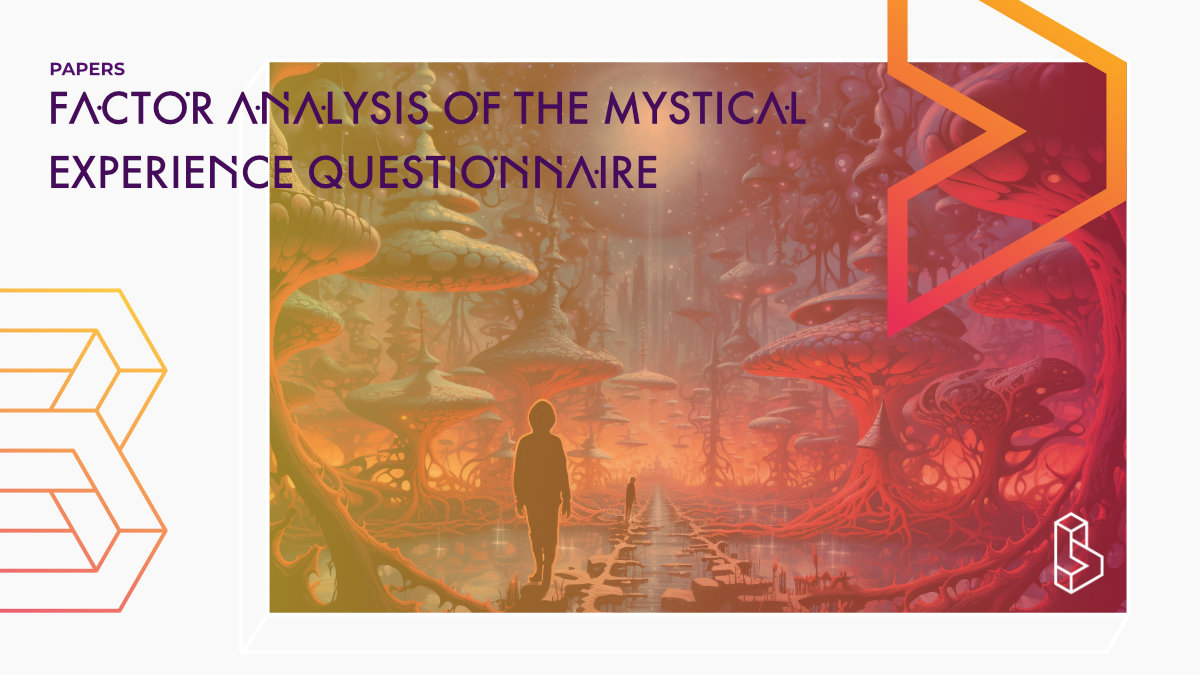This two-part survey study (n=1602, n=440) examined the factor structure of the Mystical Experience Questionnaire (MEQ). This self‐report measure has been used to assess the effects of psychedelics in laboratory studies. The results provide initial evidence of the validity, reliability, and four-factor structure of a 30‐item scale for measuring single, hallucinogen‐occasioned mystical experiences.
Abstract of Factor analysis of the mystical experience questionnaire
“A large body of historical evidence describes the use of hallucinogenic compounds, such as psilocybin mushrooms, for religious purposes. But few scientific studies have attempted to measure or characterize hallucinogen‐occasioned spiritual experiences. The present study examined the factor structure of the Mystical Experience Questionnaire (MEQ), a self‐report measure that has been used to assess the effects of hallucinogens in laboratory studies. Participants (N = 1,602) completed the 43‐item MEQ in reference to a mystical or profound experience they had had after ingesting psilocybin. Exploratory factor analysis of the MEQ retained 30 items and revealed a four‐factor structure covering the dimensions of classic mystical experience: unity, noetic quality, sacredness (F1); positive mood (F2); transcendence of time/space (F3); and ineffability (F4). MEQ factor scores showed good internal reliability and correlated with the Hood Mysticism Scale, indicating convergent validity. Participants who endorsed having had a mystical experience on psilocybin, compared to those who did not, had significantly higher factor scores, indicating construct validity. The four‐factor structure was confirmed in a second sample (N = 440) and demonstrated superior fit compared to alternative models. The results provide initial evidence of the validity, reliability, and factor structure of a 30‐item scale for measuring single, hallucinogen‐occasioned mystical experiences, which may be a useful tool in the scientific study of mysticism.”
Authors: Katherine A. MacLean, Jeannie‐Marie S. Leoutsakos, Matthew W. Johnson & Roland R. Griffiths
Summary of Factor analysis of the mystical experience questionnaire
Mystical experiences are a common component of religious traditions across human history. Few empirical studies have investigated single mystical experiences, and little is known of the specific causes and conditions that might elicit or promote mystical experiences.
Psilocybin, a hallucinogen found in more than 100 species of mushrooms, is used as a spiritual sacrament in some cultures and is also used for personal growth and exploration. Laboratory studies have shown that psilocybin can reliably occasion mystical-type experiences that are associated with persisting increases in personal well-being, life satisfaction, and positive behavior change.
To assess the validity, reliability, and factor structure of the Mystical Experience Questionnaire, which is an unvalidated self-report measure of mystical experiences, we administered a web-based survey to a large, heterogeneous sample of individuals who endorsed having had a profound experience after ingesting psilocybin mushrooms.
Find this paper
https://doi.org/10.1111/j.1468-5906.2012.01685.x
Open Access | Google Scholar | Backup | 🕊
Cite this paper (APA)
MacLean, K. A., Leoutsakos, J. M. S., Johnson, M. W., & Griffiths, R. R. (2012). Factor analysis of the mystical experience questionnaire: A study of experiences occasioned by the hallucinogen psilocybin. Journal for the scientific study of religion, 51(4), 721-737.
Authors
Authors associated with this publication with profiles on Blossom
Matthew JohnsonMatthew Johnson is an Associate Professor of Psychiatry and Behavioral Sciences at Johns Hopkins University. His research is concerned with addiction medicine, drug abuse, and drug dependence.
Roland Griffiths
Roland R. Griffiths is one of the strongest voices in psychedelics research. With over 400 journal articles under his belt and as one of the first researchers in the psychedelics renaissance, he has been a vital part of the research community.
Institutes
Institutes associated with this publication
Johns Hopkins UniversityJohns Hopkins University (Medicine) is host to the Center for Psychedelic and Consciousness Research, which is one of the leading research institutes into psychedelics. The center is led by Roland Griffiths and Matthew Johnson.

